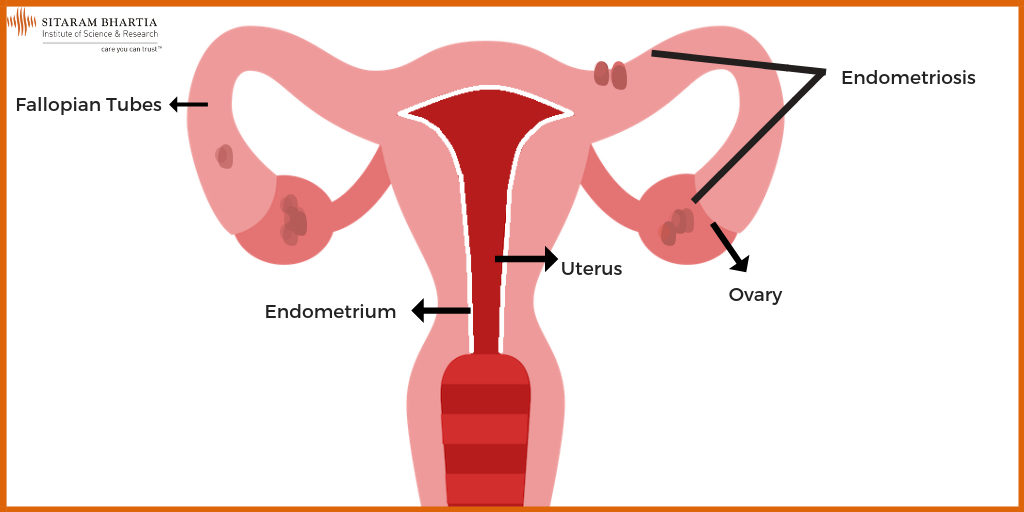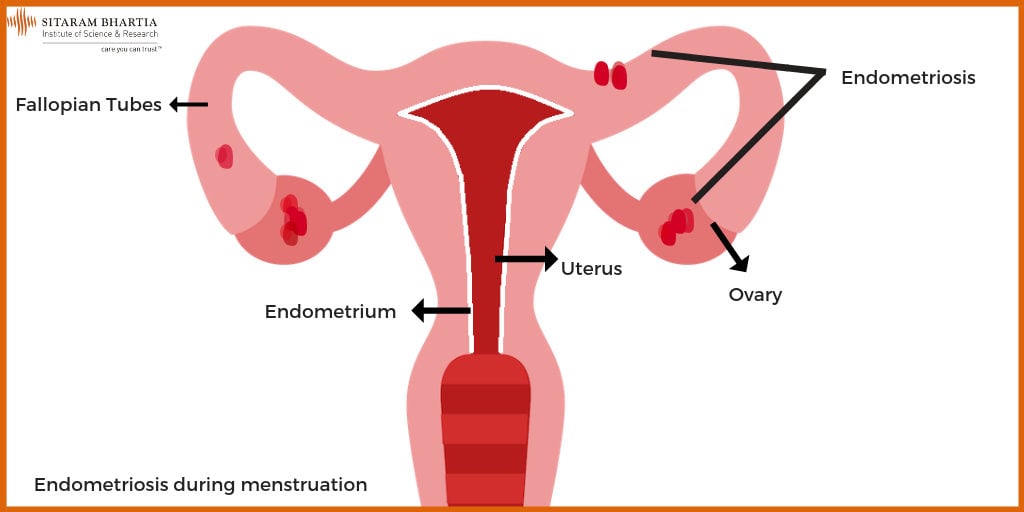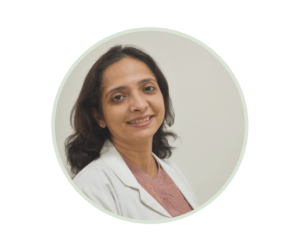Endometriosis is considered one of the three major causes of female infertility. Endometriosis and pregnancy are often thought to not co-exist.
“Most women believe that they won’t be able to conceive naturally, but this isn’t necessarily true,” reassures Dr Priti Arora Dhamija, Senior Gynecologist & Fertility Specialist at Sitaram Bhartia Hospital in South Delhi.
Esha K. Malia, 27, was diagnosed with endometriosis five years ago. It wasn’t until she got married and wanted to have children that she started thinking that her condition could cause a problem.
Before proceeding any further, she wanted to discuss her chances with a trusted doctor.
She came with her husband, Karthik, for their appointment with Dr Priti with many questions.
After a thorough analysis of Esha’s previous medical records and taking a detailed history of the couple, Dr Priti was able to ascertain the condition better.
Karthik, on the other hand, was feeling a little confused by the back and forth between the doctor and Esha. Hesitatingly, he asked the doctor how endometriosis may affect their chances of conceiving.
What is Endometriosis and how does it affect female fertility?
Dr Priti explained, “Endometriosis is a chronic pelvic disorder wherein, the menstrual blood that is supposed to flow out of the body accumulates around the ovaries.”
“This happens because some of the endometrial tissue is found outside the uterus. These tissues are part of the lining that thickens, breaks down and bleeds every menstrual cycle, which continues to do so even outside the uterus.”
“This results in extreme pain and in some cases, it may affect the fertility of the woman.”


“The accumulated blood displaces normal ovarian tissue and causes ovaries to get stuck to the surrounding structure (adhesions). This upsets the orientation of tubes and the ovaries to each other.”
“Toxins released from the endometrioma (endometriotic cysts) can be harmful to the sperm and/or egg leading to impaired fertilization.”
Endometriosis can be divided into 4 stages ranging from mild to severe cases, which depends on the location, amount, depth and size of the endometrial deposits. These stages don’t necessarily correlate with symptoms experienced by the women.
Now that Karthik had a better understanding of the situation, Esha also felt more confident to ask her concerns.
She then asked the doctor about the chances of getting pregnant with endometriosis.
What are the chances of getting pregnant with endometriosis?
Dr Priti assured the couple that the chances of getting pregnant with endometriosis are much better than their expectations.
Dr Priti emphasized, “There is a huge misconception that all women with endometriosis are infertile. Not every woman with mild endometriosis would face difficulty when trying to conceive naturally.”
According to this, 1 in 10 women have endometriosis during their reproductive years. The endometriosis and pregnancy rates are decent as only 25 – 40% of these women may face difficulty when trying to conceive.
“The chances of conceiving naturally may decrease as the severity of the disease increases. Therefore, some women may need medical assistance to get pregnant.”
Esha asked the doctor, “Is it possible to get pregnant with endometriosis naturally?”
She answers, “It may be possible for women with endometriosis to conceive naturally, especially those with mild endometriosis.”
Esha inquired how to go about it.
How to get pregnant with endometriosis naturally
Dr Priti asked the couple how long have they been trying to get pregnant to which the couple replied they have only started planning.
The infertility specialist cautioned, “Endometriosis tends to get worse with time. Therefore, it would be better if you start trying as soon as possible.”
“Remember, even a healthy couple takes time to conceive. So don’t be disappointed if you don’t see quick results.”
They were advised to try for 6 months and then to come back for a follow-up consultation.
The couple visibly relaxed upon hearing this and grabbed each other’s hands.
Is hormonal therapy advised?
Dr Priti highlighted, “Hormonal therapy maybe advised when it comes to managing mild endometriosis.”
“A variety of drugs are available – either to enhance fertility or to curb endometriosis – and these should be selected only after a detailed consultation with your gynecologist.”
“In case of mild endometriosis like yours, it may be better to try for pregnancy naturally first. If you aren’t able to conceive then we’ll look for any co-existing conditions.”
Esha asked the doctor, “Will I need surgery?”
The doctor answered, “Surgery is usually advised in cases of acute pain, failed medical treatment or severe cases of endometriosis.”
“In surgical treatment, the endometriotic adhesions are cut out and destroyed or vaporised which removes the accumulate blood and improves fertility along with the pain. Hormonal therapy may be required to remove the residual deposits that couldn’t be removed during surgery.”
“If required, the procedure can also be done laparoscopically which results in fewer and smaller cuts, shorter hospital stay and quicker recovery time.”
The doctor assured Esha that her condition didn’t require surgery as of now.
Endometriosis and Pregnancy: When is IVF needed?
“The need for any fertility treatment is determined by the severity of the disease, the woman’s age, how long the couple has been trying and the existence of any other fertility problem.”
“In severe cases, it may be the only option but it might not hold true for every woman.”
The couple discussed the various options at their disposal and were rather happy to know that pregnancy isn’t a far-fetched dream as it seemed before.
Esha then enquired about any risks due to endometriosis and pregnancy.
Can endometriosis affect my pregnancy?
Dr Priti explained, “Endometriosis won’t affect your pregnancy, although the condition may cause a delay in conception.”
“In fact, pregnancy can help suppress endometriosis to an extent.”
After pre-conceptional testing which comprised screening for blood type and screen, rubella and such parameters, the couple left the hospital feeling more optimistic about the journey ahead.
Karthik and Esha’s endometriosis and pregnancy success story
Esha and Karthik started trying as per Dr Priti’s suggestion. After 6 months, the couple was unable to conceive but didn’t lose hope.
Esha and Karthik then consulted Dr Priti about what should be their next step. Esha had mild endometriosis and was therefore suggested to go for ovulation induction (OI) and Intrauterine Insemination (IUI).
The couple was able to conceive after their second IUI cycle and were filled with joy.
“We’re so happy we were able to get help at every step of the way – from understanding our options, to going through the required treatment – the right guidance can really make ALL the difference,” she says.
Esha is currently 4 months pregnant and looking forward to welcome her baby soon.
This blog post was created with editorial inputs by Dr Priti Arora Dhamija. Dr Priti has over 14 years of experience as an obstetrician–gynecologist with a keen interest and wide experience in infertility treatments. She is known for her calm approach and listening ear which has added to her goodwill among patients and colleagues alike!
Learn more about Fertility Services at Sitaram Bhartia
This article has been written with inputs from Dr. Priti Arora Dhamija, who has over 16 years of experience as a fertility specialist and obstetrician-gynecologist. She has received training from the Indian Fertility Society in Assisted Reproductive Technologies and fertility enhancing laparoscopy.

Dr. Priti Arora Dhamija, MBBS, Maulana Azad Medical College, Delhi (1999); M.D, Lady Hardinge Medical College (2004); DNB Obstetrics & Gynecology (2004); Diploma in Pelvic Endoscopy, Kiel, Germany (2014)
Here are some other blog post written with her inputs:


